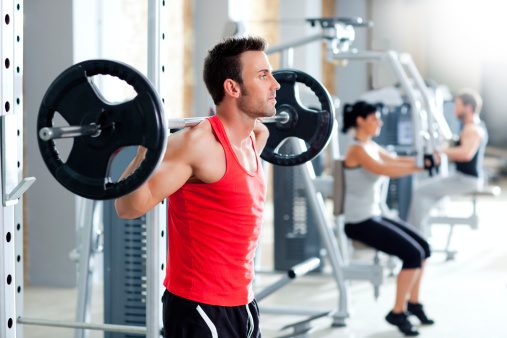Weight Training 101

Should you be hitting the gym this off season? You bet. Join us for this weekly series that will demystify the weight room.
Week 1: Should you even be here?
Absolutely. Weight training doesn’t have to lead to extensive weight gain, which is one of the biggest fears of many triathletes, and can be an integral part of a balanced training program that improves power and strength, while also helping to prevent injury. Here are a few reasons why you should be looking to hit the gym this winter:
Power and Strength improvements
“Although research reports mixed results, my experience from coaching hundreds of athletes over 30 years is that lifting weights definitely improves performance of those who lack power, and this applies especially to those who are new to triathlon,” writes Joe Friel in his book Your First Triathlon.
Friel is hardly the first triathlon coach to sing the praises of strength training. In his book Dave Scott’s Triathlon Training, published in 1986, the six-time Ironman World Champion had this to say:
“One of the key factors in triathlon efficiency is upper-body strength. Most people do not realize that cycling requires strength-and endurance-in your arm, abdominal, shoulder and back muscles, so they are not prepared for the shock to their upper bodies when they get on their bikes. Obviously, fortifying those muscles will help prevent the cumulative fatigue, and will enable you to start the run fresher.”
Improved muscle mass
Research suggests that once you hit 40 you lose about one percent of your lean muscle mass every year, making strength training even more important for master’s competitors.
Craig Alexander, the oldest man to win the Ironman World Championship, swore by his strength training program as he approached his late 30s, making it an integral part of his training regimen year round. Alexander feels that strength training is a critical part of an “older” triathlete’s regimen. Alexander had Scott put together his weight training programs, an apt fit as Scott was a runner up in Kona at the age of 40, and finished fifth as a 42-year-old, which is, ironically, the average age of the athletes who race in Kona.
Injury Prevention
According to the web site Stretchcoach.com: “Strength training improves the strength of the muscles, tendons, and even the ligaments and bones. The stronger muscles and tendons help hold the body in proper alignment and protect the bones and joints when moving or under impact. The bones become stronger due to the overload placed on them during training and the ligaments become more flexible and better at absorbing the shock applied to them during dynamic movements.”
You probably do have time
Many triathletes will eschew a weight training program because they feel it will take too much time, and keep them away from their swim, bike and run workouts.
“The biggest factor in determining whether you should lift weights is how much time you have available to do it,” writes Friel. “If you just can’t find a way to fit even a few more minutes of strength-building exercises into your week, then strength training must be left out … But I suspect that it is possible to do some strength building with a little creative thinking about how you use your time.”
Most triathlon coaches will agree that any triathlon-oriented weight program should not take a lot of time. Scott suggests a 30 to 45 minute program three to four times a week, but you certainly can get a lot of benefits in considerably less time than that. Combining workouts, for example hitting the weight room quickly after a run or swim workout, is another way to maximise the time-efficiency of your workout.
So, it’s settled. Finding a gym to work out in might not be such a bad idea. Next week we’ll talk about the different types of weight training, and what might be best for you.
